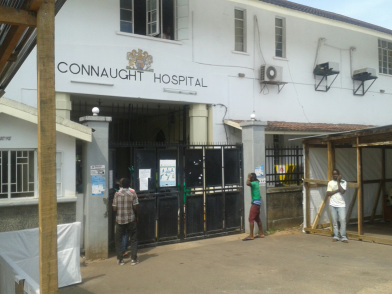Putting citizens at the heart of the fight against Ebola

I arrived in Freetown last week and saw my first Ebola sufferer yesterday. While Zombies may not spread Ebola, like some initial rumors suggested, sufferers are still referred to as Zombies; they stumble forward slowly, expressionless, in a confused daze.
I was outside Freetown’s Connaught hospital, where the poor man was being led through the bustling streets. Outside the hospital gate crowds gather waiting for news, some cry, some pray, some shout to try and talk to loved ones inside. Round the corner at the morgue, it’s a similar scene with crowds gathered, many in tears. But here no one who is shouting expects a response. Elsewhere on the street, life goes on; people sell their wares and walk on by and ignore the commotion.
In Freetown the signs of the crisis are rather subtle. There are plenty of posters proclaiming that “Ebola is real”, there are buckets of chlorine outside supermarkets and offices, and people take your temperature as you come and go – a reassuringly consistent 36.6° C – but not quite what I expected to see when I left the UK. Freetown, it must be said, is somewhat unique and Ebola has, and continues to have, a massive impact on Sierra Leone and it’s people, especially in rural communities.
The indiscriminate virus is not, however, affecting lives as one might expect. There is growing concern about a ‘second crisis’ as major public health issues like malaria are sidelined and the suspension of free maternal and child health care leaves many vulnerable.
All hands on the Ebola deck produces other health risks in a country where the health system is already poorly resourced and staffed. Even if there are health services for other diseases, either the fear of catching Ebola or being stigmatized as an Ebola sufferer, makes people think twice about using them. There is also a concern as to whether the fear and stigmatization of Ebola is preventing the reporting of new suspected cases. As one NGO manager told me: “we are all interested in the apparent drop in reported cases in Liberia. Where once there were no beds, now centres sit empty. Why?”
Another aspect of the second crisis is the fear of an impending food shortage. Quarantines of Ebola houses, as well as broader restrictions on movement have hit all economic activity, especially around food, with the UN warning that “in some areas, hunger has become an even greater concern than the virus”. This invisible and deadly virus is leaving some very visible scars in a wide variety of places.
Such a far-reaching and devastating disease needs an equally far-reaching and powerful response, and despite being far too late, this is what we are beginning to see. The Sierra Leone government, with support from the international community, is stepping up its game.
There is still a lot to do but we now have management systems and humanitarian agencies in place coordinating the response. Given the complexity of this crisis, there is no room for complacency. The priority now is a regular and reliable source of data on the effectiveness of various aspects of the response. There are some streams of data; standard knowledge, attitudes and practices surveys (KAP), a long list of KPIs and output data, but what Keystone’s Ground Truth programme hopes to add to the data mix is weekly light touch feedback gathered on key perception indicators from both the broader population and direct from frontline staff, who are in a unique vantage point.
The data, presented in a simple dashboard, will be fed direct into the management systems of both the central response committee and all implementing agencies, empowering them to track the response from the perspectives of those living at the centre of the crisis.
Perhaps the most noticeable indication of the crisis to a European visiting Freetown is that no one shakes hands. I walk into meetings and have bizarre, awkward interactions. We all smile and nod politely, firmly holding our arms down trying to resist the natural urge to extend a hand. I never realized how much we rely on a handshake to introduce ourselves and as a sign of working together. But don’t let it fool you; there is real collaboration going on, a real commitment to working together which extends beyond the symbolic gesture of touching hands. The only thing to ensure now is that we extend a hand to those who we are all here to help, and involve them and their views in the way this response is managed.
